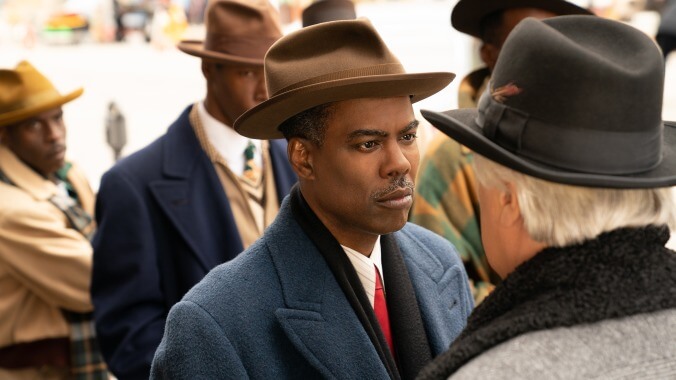Chris Rock commands the moral gray areas of Fargo season four


It’s good to be back in Fargo, which has always served as more of a feel or state of mind than a location in Noah Hawley’s TV adaptation of Joel and Ethan Coen’s film of the same name. The wait between seasons three and four has felt nigh-interminable—and that was before production shut down due to concerns stemming from the coronavirus pandemic. While absence has almost certainly made the heart grow fonder, the combination of another stellar cast and richly detailed storytelling proves a much greater lure. If Fargo’s ambitions get the better of it sometimes, at least it’s in keeping with season four’s exploration of the elusive (for most) American dream.
The fourth season marks a few departures for Fargo, as the action travels to Kansas City, Missouri, over 700 miles from the series’ Minnesota birthplace. The tone of the new episodes is often bleaker than in previous installments: The winters in Kansas City may be milder than in Minneapolis, but the prospects for our central players are far from sunny. Which isn’t to say that the show has lost all of its whimsy; the usual roster of delightful character names is very much present (there’s even a U.S. Marshal named Dick Wickware). But aside from the occasional cacophonous fart fit, humor rarely ever breaks the ever-escalating tensions between the factions trying to rule this Midwestern city. By the end of the nine episodes available for review, the show has even been drained of its muted autumnal palette, shifting to black-and-white cinematography in a standout entry.
And for the first time, the title cards that claim the story unfolding is a true one are more than cheeky openers. Kansas City might not call to mind “organized crime” as readily as New York City and Chicago do, but Hawley’s clearly taken inspiration from that metropolis’ history of crime families. In his telling, the Jewish-led Moskowitz Syndicate stakes their claim to Kansas City at the turn of the 20th century, but ultimately fall to the Irish-led Milligan Concern, who then attempt to broker peace with the Italian Fadda family. By the 1950s, the Fadda family contends with a new challenger—the Cannon Limited, an organized crime outfit not unlike the Moskowitz Syndicate or the Milligan Concern. The difference being, the Cannon group is made up of Black Americans who left the Jim Crow South, like the Exodusters, seeking new opportunities in more northern states.
Chris Rock stars as Loy Cannon, who heads up what our perspicacious narrator describes as the latest group ready to “get rich the old-fashioned way”—in a country built on stolen land and with stolen labor, this means more stealing. A family man, Loy doesn’t revel in behaving badly, but he rarely balks at it, either. He’s the type of ambitious, conflicted man who’s often at the center of these tales of the seductiveness of power. But he isn’t the hero of this piece; another divergence from seasons past is a refusal to dub any of its new characters good guys or outright villains. Hawley ventures deep into the moral grays, where he’s previously thrived, finding new shades of slate and limestone. As befits real-life calls for police reform (if not abolition)—not to mention working with Black writers like Stefani Robinson—sporting a badge isn’t tantamount to being a white hat. The innocent don’t stay that way for long; neither do the guilty.
Early on, that ambiguity costs the new season some of its cohesion, something that is also hindered by the ever-expanding cast. The premiere is welcome and witty, with inventive rituals—warring families trade their youngest sons as a way to foster peace and cultural understanding—but paired with the second episode (also helmed and written by Hawley), it can feel like the show is running through its call sheet. We meet Josto Fadda (Jason Schwartzman, as the Little Lord Fauntleroy of the manor), who represents Loy’s competition, but is himself beset by a brother Gaetano (Gomorrah’s Salvatore Esposito) who has come to America from “the old country” to take his (arguably) rightful place at the head of the family. Josto crosses paths with Oraetta Mayflower (Jessie Buckley), a nurse and angel of death by day; Oraetta sizes up her young neighbor, Ethelrida (vibrant newcomer E’myri Crutchfield), whose intelligence makes more trouble for her at school than actual acting out would. Then there’s the stately Doctor Senator (the equally stately Glynn Turman), Loy’s right-hand man; Constant Calamita (Gaetano Bruno), Josto’s heavy who’s on loan to Gaetano; Karen Aldridge and Kelsey Asbille as a pair of lesbian lovers who do crimes; and oh yes, Jack Huston as a guilt-ridden detective and Timothy Olyphant as the aforementioned Dick (who actually goes by “Deafy”), a federal marshal and a Mormon.
That’s but a fraction of Fargo’s players—we haven’t even gotten to Dr. Harvard (Stephen Spencer), who mocks “rubes in Minnesota” in one of several callbacks, or the haunted Rabbi Milligan (Ben Whishaw), who’s already seen so much upheaval in K.C.’s demimonde, and whose last name may or may not establish a connection to season two. The show’s most compelling characters still manage to come to the fore, but even the detours are a surprising amount of fun, thanks to wonderful performances across the board. As Josto, Schwartzman has the best grasp of the humor that’s always on the verge of going pitch-black, and he can be formidable when needed. Ethelrida is the closest to a moral compass that we get this season, and Crutchfield shows considerable range playing her as a searching adolescent. Huston makes Odis’ flop sweat as palpable as his post-traumatic stress, while Olyphant radiates rugged charm as he effectively channels Raylan Givens.
Rock holds his own in a rare dramatic role: Loy’s speeches about who is allowed to achieve the American dream are tinged with the comedian’s familiar cadence from his previous onstage railing. But Rock comes to inhabit the role of Loy, someone whose ruthlessness and geniality inspire loyalty from his men in equal measure. He falters a bit in some of the quieter scenes, but when Loy visits his youngest son, Satchel (Rodney Jones), at the Fadda home, Rock shows some inspired character work, tenderly touching his son’s hair, which, along with his dietary needs, is hardly being looked after. Instead of racing to hit the highest dramatic register, he seeks out the notes in between.
Fargo season four is similarly studious, filling its world with pieces of this country’s history, including migration, immigration, colonization—even xenophobic legislation like the Mormon Extermination Order. In a sense, the themes of Fargo remain in place, but the scope has been widened greatly—this isn’t the story of a flawed individual, but of flawed governance. These are not the sins of a few corrupt people, but of an entire nation. That would be a tall order for a more straightforward drama, and Fargo occasionally strains under the weight of what it’s attempting to accomplish: a lively examination of the history of different groups of Western European immigrants who have gradually been granted whiteness, and the many Black Americans, whose ancestors were brought here by force (and greed), but are now, as Doctor Senator puts it, a “part of this land, like the wind and the dirt.” While that doesn’t offer the same hook as a possible UFO sighting in Minnesota, it still has the potential to be Fargo at its best.
Reviews by Zack Handlen will run weekly.